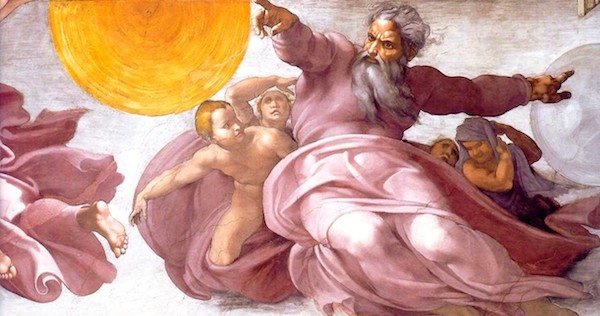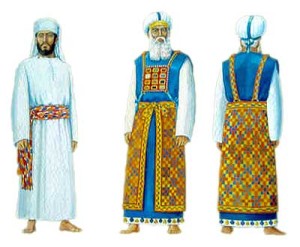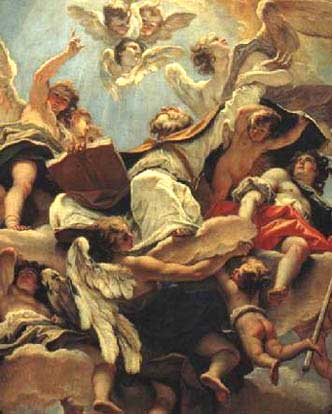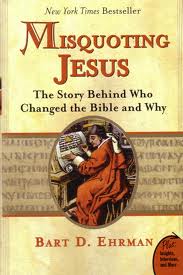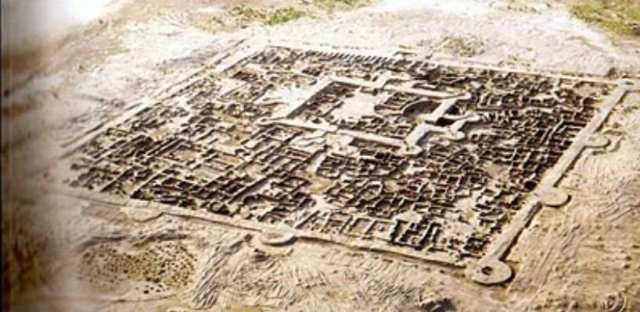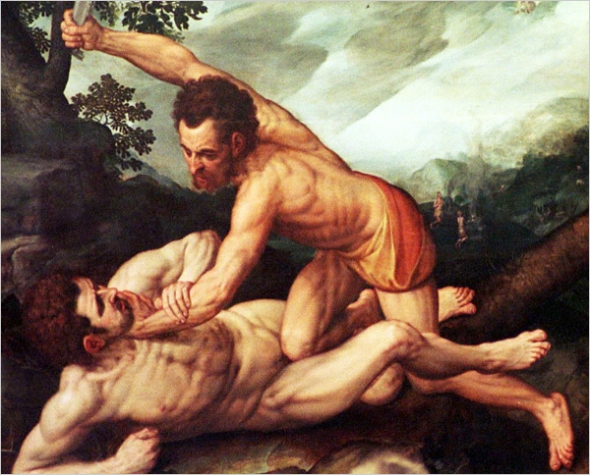
And it came to pass that man began to multiply on the face of the earth, and daughters were born to them. The sons of the gods saw that the daughters of man were attractive. So they took for themselves wives from any they chose. Then YHWH said, “My Spirit shall not remain in man forever, for he is flesh – their days shall be 120 years.” The fallen ones were on the earth both in those days and afterward, when the sons of the gods came in to the daughters of man, who bore children to them. They were the powerful men of old, the famous men.
When YHWH saw that man’s wickedness was widespread on the earth and that every scheme his mind thought of was nothing but evil all the time, YHWH regretted that He had made man on the earth, and He was grieved in His heart. Then YHWH said, “I will wipe off from the face of the earth mankind, whom I created, together with the animals, creatures that crawl, and birds of the sky—for I regret that I made them.” Noah, however, found favor in the sight of YHWH.
Note on the translation: I have chosen to translate “elohim” as “gods,” because the term can either be singular, as in another name corresponding to the same being as YHWH, or it can be plural (all of the cases where you read about strange gods in the Old Testament have the same term “elohim” for the plural “gods”). The author has also taken care not to call Adam a “son of God,” although being made “in the image and after the likeness of God” is essentially equivalent to the concept. Consequently, I believe the author is concerned with differentiating between God’s creation of man and the theology promoted by the “sons of the gods,” which will be discussed in brief below.
Sons of the Gods
We had a break in the story of the corruption that increased after Adam and Eve were expelled from the garden when we looked at the descendents of Seth. The story now returns to the problem of increasing corruption in the world. However, some technical Hebrew language is being used here that is difficult to for us to understand, as we don’t use these sorts of expressions.
In the ancient near east, the term “son of God” was commonly used to describe every king. Each city had their own god and each king was considered to be the son of that God. The people viewed the land as being owned by the gods and so only those few who were adopted by the gods to become their “children” could rule over that land in the place of the gods. For example, king Eannatum inscribed on the Steele of Vultures that he was the son of the supreme god Ningirsu and Innana (war goddess). Far from being insane, elsewhere Eannatum admits that his earthly father was in fact king Akurgal.[1] What he means to communicate is that he is the representative of these two deities and thus had divine permission to rule and conquer in a land that is not owned by him or any other mortal man.
But if Babylonian claims are too far removed from the Israelite captivity in Egypt (although Abram came out of Babylon in the first place, being from Ur…), then even stronger evidence from Egypt can be demonstrated. For example, an Egyptian coffin text that reads,
“O Thoth, who are those who are like the sons of Nut? They have stirred up hostilities, they have raised storms, they have committed iniquity, they have raised rebellion, they have perpetrated murder, they have done oppression, and furthermore they make the great to be small in all I have done. Grant, O Thoth, that that may take place which Tum has commanded, viz., thou shalt not see evil, thou shalt not suffer for their years are but dust, and their months are nearing (their end), while they are designing evil against what I have done.
Tum answers: henceforth he who has previously been directed by the Princes, he will rule (on his throne, and his son will inherit his throne) in the isle of fire… And further, I am going to deface all I have done; this earth will become water (or an ocean) through an inundation, as it was at the beginning. It is good what I have done to Osiris, exalting him above all gods. I give him the power over the land of the Netherworld; his son Horus will inherit his throne in the isle of flame. I have placed his throne in the boat of millions, I have given him what the Princes have ruled over, (that he should do) what he likes on earth, in order that Horus may stand on his seat and that he may take possession of his place of rest.”
The sons of Nut appear to be equated with the “princes” who rule over the earth, whose authority is about to be taken from them through a flood and then given to someone more deserving, namely the God of the Pharaoh (consequently, the Pharaoh is claimed to now have the right to rule over the earth since the God he is the son of is now in charge). So, whether you’re in Babylon or in Egypt, the sons of the gods are princes and kings who rule over the earth.
These “sons of gods” took whoever they wanted for their wives, filling up harms with women. These women were but sexual toys for them, and the sons of the gods claimed to have the right to any and every woman. We see this when the king of Egypt tried to take Sarah, or again when Abimilech the king of the Philistines also tried to take Sarah. We see this also in the story of Esther, where king Xerxes has many wives and chooses Esther to be the main wife over the rest. All of these kings claimed to be sons of the gods. This theology had a beginning somewhere, and I am arguing that this beginning began with Lamech.
Lamech had multiple wives and could kill whomever he liked, threatening that even the slightest damage done to him would result in total slaughter to the offender. This description sounds suspiciously similar to how the kings who called themselves the sons of the gods acted. Then, from today’s text, we see that individuals called “the sons of the gods” chose whichever wives they want.
The text before us holds out their treatment of women as corrupt and evil, and so it is. These men falsely claimed to be the sons of imaginary gods in order to gain power over others, abusing it and ultimately abusing women as playthings and toys. It is this treatment of women that brings forth God’s curse. We saw, last week, from the Sumerian King List that these corrupt kings were ruling for on average 800 years and thus for hundreds of years at a time were terrorizing women and filling harems with women. God looked down on this with such contempt that he decided to reduce the human lifespan down to a maximum of 120 years. So, why is it that very few of us make it past 110 and that the oldest age that has been verified was 122? It’s because of the corruption that we are prone to, and for the sake of reducing that corruption by reducing our lifespan.
Are you guilty of this yourself? God made both men and women in his imagine and after his likeness – both are of equal value. Have you favored one over the other? Or perhaps have you judged people according to their skin color or social or economic background? If so, then your life demonstrates the same sort of attitude that these kings demonstrated when they collected women like toys and prizes.
The only distinction God draws in terms of value is between those who trust in Him and love Him and between those who do not trust in Him and love Him. Apart from this, any distinctions for the purpose of showing favoritism or contempt is disgusting in the eyes of a God who agrees with none of your distinctions.
Theology of the Sons of the Gods
Earlier I said that I am arguing that the “son of god” theology – the view that only the king is the son of a god – began with Lamech. I am making this argument because we have found inscriptions from ancients such as Assurbanipal who would write things such as: “I am versed in the craft of the sage Adapa [a pre-flood hero]; I have studied the secret lore of the scribal craft and have memorized the celestial and terrestrial numbers…. I have read intricate tablets inscribed with obscure messages of both Sumerian and Akkadian, difficult to unravel, and examined sealed, obscure, and confused inscriptions on stone from before the Deluge.”[2] Assuming that there is some truth to this, it seems that there were inscriptions on stones that survived the flood and thus brought forward the pre-flood worldview. From the Biblical perspective, this would have been encouraged by Ham, who was around prior to the flood, and from whom the nations who most openly propagated the “son of god” theology descended.
So far we’ve considered what the term “sons of the gods” would mean to an ancient audience and we have seen that the description of their actions fits with what was done by the “sons of the gods” in the ancient Near East. However, while the limitation on the lifespan of man is brought about by the treatment of women, the reason for the flood is far more general. We read the scriptures say “YHWH saw that man’s wickedness was widespread on the earth and that every scheme his mind thought of was nothing but evil all the time.” This is a very broad statement and leaves us with very little in terms specificity. However, more details are available to us. We will consider two perspectives on these details: (1) the unfolding problem of sin in Genesis; (2) the theology of the sons of the gods that we have records of.
First, the problem of sin in Genesis, as we have seen, is not merely knowing evil. The best translation, based on the whole Fall story, is that Adam and Eve ate from “the tree of determining good and evil.” They became people who set their own moral codes and values, rather than submitting to God’s. This problem is seen in how Accomplish (Cain) responds to rejection – killing the one who is approved. Then Accomplish’s descendent, Lamech, demonstrates the problem further by rejecting monogamy and throwing off the view that humans have equally valuable lives (killing people freely). These are cases of people determining what is right in their own eyes, and so living by their own standards. This, ultimately, is done because people love themselves more than they love God and His ways. So, in short, the problem of evil on the earth and why every thought is only evil continually is centred in the fact that people are determining right and wrong for themselves.
Second, we see that this is also the issue with the theology that the sons of the gods produced for the peoples. They taught that only they were special children of the gods and that everyone else is scum that needs to submit to these wise and great kings. They set up elaborate priesthoods and temples, giving priests lands and many financial benefits, so that their support of the king was really ensuring their own riches. This high class priesthood and the king that ultimately presided over them were teaching lies and misleading the population in order to achieve their own comfort. They were doing what was right in their eyes and enforcing their views upon others. In short, the leaders were corrupt and acting as gods. The religion was corrupt; just a pack of lies. The whole of the world was either submitting to the corruption of liars or following their own made up moral standards. All of this was, of course, horrendous in the eyes of the God who made the world for these people and continued to give them life, food and every good thing.
Thus, the problem of sin, which is people loving themselves over God and thus doing what is right in their own eyes, resulted in God’s judgment: first, in reducing their life-spans; second, in wiping out the whole corrupt system from the world. We can see this problem continuing in our lives today. Don’t we all continue to do what is right in our own eyes? Even those of us who are Christians, who claim to follow Christ, don’t we often act on moral standards that we made up rather than what God has set down?
Carefully examine your life and your actions. What motivates the things you do? What standards do you live by? If you are hasty, you will lie to yourself and say “I do everything for God and I live by God’s standards.” You definitely do not do everything for God and you most definitely fail to live by God’s standards. This is why Paul says that “all have sinned and fall short of the glory of God.”
We daily need to evaluate what is directing our choices and decisions. For our default position is to do what feels right to us, which is most probably the wrong thing in God’s eyes.
The Nephilim
Lastly we will deal with the issue of the fallen ones and the heroes of old. I’m sure that you’ve heard many things about these fellows. Some want to say that these are half demon and half human monster giants. This, at least for me, is what I heard for many years. However, is that really where the evidence leads?
We saw that the sons of the gods were kings claiming divine parentage, a claim which continued all the way to the Roman times when the Emperors claimed to be gods. This even only recently came to an end in Japan, where Shintoism claimed that the king was the son of the sun god and thus must be obeyed. So, angels aren’t even in the picture in this text, especially given the fact that angels neither marry nor are given in marriage (Matt 22:30). Furthermore, these fallen ones are there at the time when the sons of the gods were creating their harems and having children, so they can’t be the result of these unions.
The term used is Naphal (נָפַל), which means to fall down or prostrate oneself. It can be used in terms of worship (falling down as in bowing in worship) – meaning these could be the priests and worshipers of the sons of the gods. Or, it could be a reference to how they were doomed to die. Both in Isaiah (Isa 14) and Ezekiel (Ezek 32) the powerful leaders who were held in high esteem during their lives are described as fallen ones. Since Numbers 13:33 speaks of them as being very large, it makes more sense that these individuals are not necessarily worshipers of the sons of the gods but rather large and powerful warriors.
This understanding further fits with the ancient writings. We see that the heroes in the ancient writings were usually larger than others and more powerful as well, domineering their strength over others to gain control over them. Thus, on top of the clever sons of the gods controlling religious beliefs for their benefits there are also those with physical power taking advantage of those who are weaker. Everyone who has an advantage in life is using it to overthrow the weaker, be it intellectually or physically.
We should then look at our own lives and the talents and skills God has blessed us with. Are we being, or have we been, like the fallen ones who domineered their strength and size over others? Or perhaps we’re especially clever, like the sons of the gods, and we’ve used this to get the better of those with duller wits? These sorts of sins have been taking place since before the flood.
God has given strengths to some so that they can use those strengths to the benefit of others. To other God has given weaknesses so that here may be opportunity for service – blindness is given so that the deeds of godliness can be done to the blind. But what do we do in a world of imbalanced strengths and weaknesses? The strong oppress the weak.
The same situations that were going on when YHWH said “I will wipe off from the face of the earth mankind, whom I created, together with the animals, creatures that crawl, and birds of the sky—for I regret that I made them,” are still going on today. Another judgment is coming, though it won’t be in the form of a giant flood. As Noah found favor in the sight of God, so we need to do the same.
We know that the problem of sin is lack of love for God which displays itself in unbelief and living by what is right in our own eyes. If you want to find favour in the eyes of God then you must turn to God and love him more than yourself, submitting yourself to His ways. His ways are righteous and good, and He is a God who saves people who deserve Hell through having Jesus pay the punishment you deserve on your behalf. Turn to Jesus for help, look to him, if you want to find favour in God’s eyes.
In coming weeks we will consider the event of the flood judgment itself, but for now we would be wise to recognize that all of the sins that brought the flood are also present in our own lives. Let us act wisely on this information, looking to Jesus alone for salvation.
[1]J. N. Postgate, “Royal Ideology and State Administration in Sumer and Akkad,” in Civilizations of the Ancient Near East, ed. Jack M. Sasson, (New York: Scribner, 1995), 397.
[2]Laurie E. Pearce, “The Scribes and Scholars of Ancient Mesopotamia,” in Civilizations of the Ancient Near East, ed. Jack M. Sasson, (New York: Scribner, 1995), 2277.
